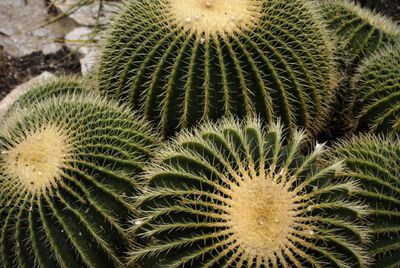How to Grow a Golden Barrel Cactus
Think carefully before locating the golden barrel in your yard, especially if you have children or pets. In that circumstance, use a container or find a safe spot, as punctures from the spines are painful and, in some cases, these punctures may require antibiotics. Conversely, you can choose to use the plant as part of your home security system, locating it under low windows as a defensive planting. Plant it in a safe spot in the water-wise landscape or in a container. Don’t crowd it in; leave room for new offsets, called pups. These babies grow from a well established root base, sometimes in clusters. They may be removed for planting elsewhere or left to fill in the bed. This cactus may also expand by branching. Sources say it is most appealing when planted outdoors in groupings, as an accent, or even a focal point in the landscape. Sometimes, the golden barrel cactus grows happily in a large container. While most say full sun is necessary, this plant does not like the hot southwestern sun during the hottest days of summer. When this cactus is planted, it situates itself to avoid this as best it can. Full sun from other directions is appropriate, though, and sometimes encourages pale yellow, bell-shaped blooms on top of the cactus.
Care for Golden Barrel Cactus
Golden barrel care is minimal. An Echinocactus, this specimen needs water infrequently. However, regular watering encourages growth and is practiced on those field-grown by nurseries. Drench the soil and let it dry completely between waterings. This plant does not like wet feet and will rot if it remains wet. Plant in any well-draining soil. Fertilization for this Mexican native is not necessary, as info about golden barrel cacti states, but may stimulate the unusual flowers. Only older, well established golden barrels bloom. Take care if pruning the cactus or replanting. Hold the plant with crushed newspapers and wear double gloves. Learning how to grow a golden barrel is easy. While the plant is endangered in its native habitat, it continues to grow in popularity in United States landscapes.
